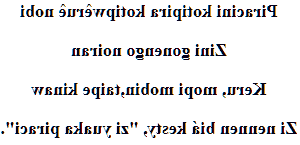Kirirí love poem
Kotipwêruê
Piracini kotipira kotipwêruê nobi
Zini gonengo noiran
Keru, mopi mobin, taipe kinaw
Zi nennen biá kesty, "zi yuaka piraci".


→ French poem ←
Xukuru language
Here is a translation of my love poem in Xukurú (other possible names : Shukurú, Kirirí, Kirirí-Xokó, Xucuru, Ichikile, Xukuru-Kariri, Sucuru).
This isolated language from the state of Pernambuco in Brazil, around the city of Pesqueira (200km to the west of Recif), is now extinct.
Originally, the Xukuru language family consisted of two languages: Xukuru and Paratió.
The Xukurus are a unique people, distinct from the Tupi, Funi-ô and Cariri, and even if they are strongly acculturated, they wish to maintain their Indianness. They are about 10,000 spread over nearly twenty-five villages.
Like the other indigenous peoples of Brazil, they have been submitted through war, conversion and with mixing with other ethnic groups or with the Portuguese. Three methods put in place by the colonizers with the aim of assimilation by erasing their culture and their language.
By force of circumstances, the Xukurus had to practice several languages, including bilingualism with Portuguese. The xukuru language of their ancestors has thus disappeared, only a few records remain.
Any language changes on contact with other languages and is transformed, and the Xukurus have gradually adapted their language to Portuguese, or through mixed marriages have forgotten it.
Today the Xukurus, if they speak Portuguese, try to revitalize their language by teaching it, from what remains, but won't they find anything other than what is lost, words are not just words, they also have a spirit!
The Xukurus
The Xukurus are the indigenous people of Serra do Ororubá in the state of Pernambuc in Brazil. Their name and their place of life reflect their thousand-year-old osmosis with nature, since a Xukuru is a bird, and an Ororubá is a type of wood.
They are often farmers and herders (vaqueiros), who live in a very fertile region crossed by many rivers and streams. Beans, cassava, corn, bananas, as well as dairy farming and many vegetables, are among their main productions.
If they had been peasant farmers for a long time, they paid the Fazendeiros the right to exploit the land of their ancestors. It was not until the end of the 2000s that, after twenty years of struggle, they could recover some of it.
Their new challenge, after reclaiming their lands, is to regain the knowledge of who they were.